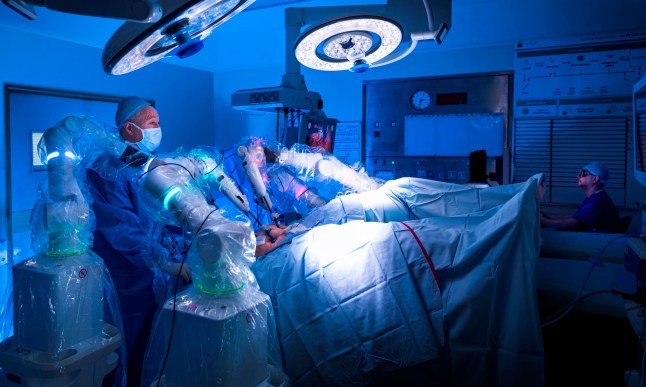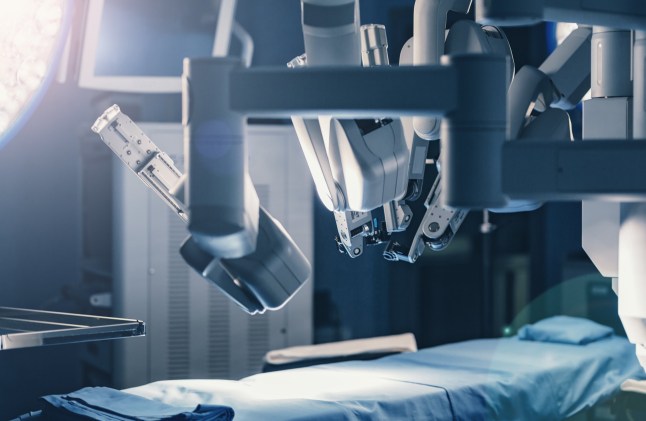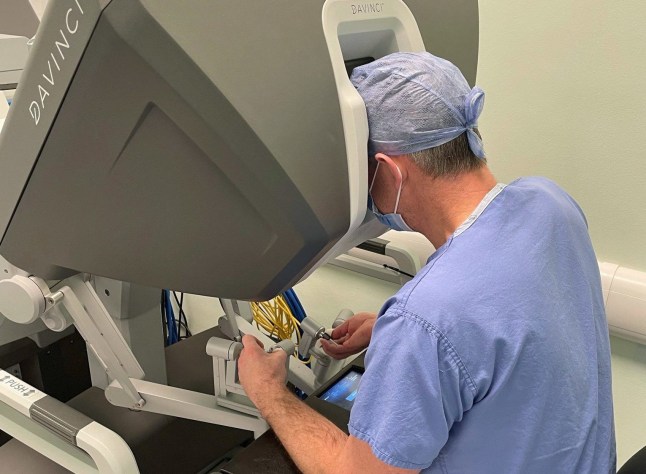 2025-04-19
IDOPRESS
2025-04-19
IDOPRESS

Doctors assist in operating the high tech robots (Picture: PA)
New state-of-the-art robotic systems that can help remove tumours or replace knees have been approved for use on the NHS – potentially transforming treatment for thousands of people in England.
The technology could shorten hospital stays and speed up recovery times,with 11 healthcare systems given the green light by the National Institute for Health and Care Excellence (NICE).
Some allow surgeons to perform operations using mechanical arms controlled from a console,while others are hand-held.
Five of the systems are used for soft tissue surgeries,such as removing tumours,repairing hernias and removing gallbladders.
The remaining six are used in orthopaedics,including knee and hip replacements.
Dr Anastasia Chalkidou,programme director of Nice’s HealthTech programme,said the technologies have the potential to transform both soft tissue and orthopaedic surgical care in the NHS.

The technology could greatly aid the NHS (Picture: Shutterstock)
‘Robot-assisted surgery may help overcome key limitations of conventional techniques through precise movements and enhanced 3d visualisation,potentially transforming surgical options and outcomes for NHS patients,’ she said.
‘Both applications could benefit patients who might not otherwise be candidates for minimally invasive approaches.’
The 11 systems will be used for the next three years,while evidence is collected about their success.
NICE will look at how the technology affects the length of hospital stays and waiting lists,as well as the resources used for training staff and the costs of implementing the systems.
Each of the systems costs between £500,000 and £1.5 million,according to the NHS spending watchdog.
They are usually deployed in specialist centres where hundreds of operations take place each year.
Dr Chalkidou added: ‘The data gathered over the next three years will allow us to evaluate exactly how these technologies can improve patient care and help ensure NHS resources are directed toward interventions that deliver meaningful clinical benefits and long-term value to our health service.’
In 2011-12,the majority of robot-assisted procedures were for urological cancer,which can include cancer in the bladder,kidney,prostate and testicles,according to NICE.
By last year,almost half of these operations were for other conditions,with a surge in the use of robotic surgeries for bowel cancer,which now accounts for a quarter of all robot-assisted procedures.
There has also been a jump in the use of the technology in orthopaedics,with 4,000 robot-assisted surgeries taking place last year,up from 300 in 2018-19.
Making greater use of digital technologies in the NHS is one of the three shifts set to be outlined by the Government in its forthcoming 10-year health plan.

Surgeons help to operate the robots (Picture: PA)
It is also expected to focus more on sickness prevention and moving care from hospitals into the community.
Professor Sir Stephen Powis,national medical director at NHS England,said: ‘This is fantastic news for patients and shows that the NHS continues to find new ways to utilise the latest technological innovations to improve care.
‘This will be a vital element of the 10-year health plan,which will be published in the coming months. Robot-assisted surgery is crucial to the future of high-quality healthcare,and with benefits including shorter stays in hospital,faster recovery for patients and less invasive procedures,these advancements will have a knock-on effect throughout the system and help patients get treated quicker.’
Nuha Yassin,a consultant colorectal surgeon and Royal College of Surgeons of England council member,said it was a ‘step forward’.
‘The potential for faster recovery times,reduced complications and increased access to minimally invasive procedures could transform patient care,’ she said.
‘It remains important that,in introducing these new technologies,NHS trusts and surgical teams ensure they are working within the guidelines set out by the Royal College of Surgeons of England,so that they are implemented in the safest way possible for patients.’